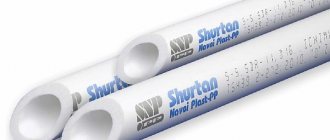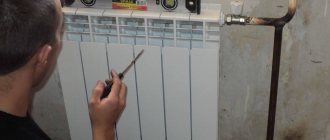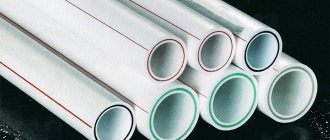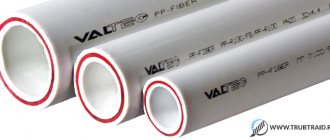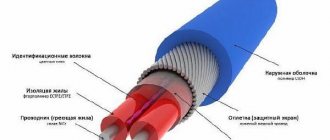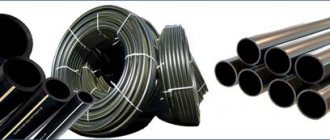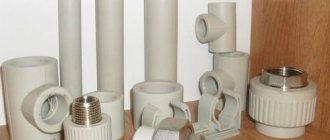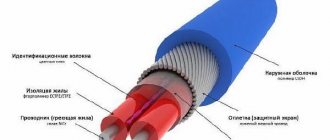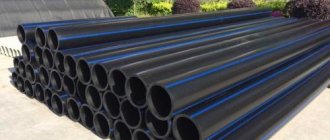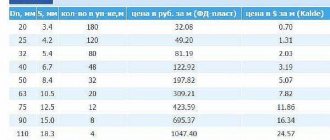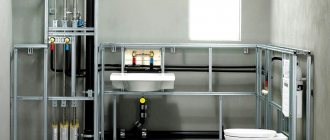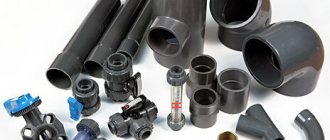To build communications in a house or apartment, use only high-quality materials. Polypropylene pipes are suitable for solving such problems. Professionals have long given preference to plastic structures over metal ones.
In this article you will learn brief characteristics of the products mentioned, watch an interesting video, and also read reviews from plumbers and electricians regarding the polymer products in question.
general characteristics
Various plastic products gradually replaced metal communications. Modern production offers several options for pipes made of this material, each of which has its own characteristics.
In the process of planning a renovation or building a new house, the question arises: which polypropylene pipe to use for heating? Such products are marked with the letters PPR. They include several varieties. In addition to polypropylene, the category of plastic products includes pipes made of polyethylene (PERT) and metal-plastic (PEX-AL-PEX).
Polypropylene differs in technical characteristics and installation features. This is one of the best, durable materials. There are several groups of polypropylene communications. Today it has become possible to install heating systems from polypropylene pipes. New technologies have made it possible to use various reinforcement methods in the production of such products. This significantly expands the scope of application of the material.
Reinforcement
Heating in a private house from polypropylene pipes is one of the best solutions today. It should be noted that polypropylene belongs to the category of materials that are deformed when exposed to high temperatures. Therefore, products made exclusively from a polymer alloy cannot be used for such purposes. Such pipes are used for cold water supply systems that are not characterized by high pressure.
To give polymer products the necessary resistance to high temperatures and prevent deformation, special reinforcement is added to their design.
An additional component is introduced into the wall of a polypropylene product: aluminum foil, fiberglass or basalt fiber. The strength and durability of the system depends on this component. Information about the material used for reinforcement must be indicated in the markings on the surface of the product.
Distinctive features of polypropylene
Currently, these products have replaced steel structures due to the following advantages:
- aesthetic appearance;
- wide area of use;
- duration of the operating period (for cold water - 100 years, for hot water - 50 years);
- no fear of high blood pressure and significant temperature changes;
- low specific gravity;
- increased rigidity and strength;
- resistance to chemical components;
- environmental cleanliness;
- excellent sound-absorbing properties;
- vibration resistance;
- low thermal conductivity;
- maintainability;
- ease of installation;
- no operating costs;
- no silting of the inner surface;
- impossibility of corrosion;
- ease of use;
- reasonable cost.
In addition to a lot of positive characteristics, it is not without drawbacks. There are few of them, but it is worth paying attention to them:
- limited plasticity;
- slight linear expansion;
- fear of ultraviolet radiation;
- unacceptability of low temperatures (except for ferrous products).
Types of heating pipes
Reinforced polypropylene pipe, regardless of the type of additional material, can be used to supply hot water through the system. Fiberglass and basalt thread are melted with the polymer during the production process. Aluminum is fixed to the polypropylene wall using special glue. The metal has perforations. This allows the connection between the inner and outer layers of the polymer to be maintained.
Reinforced polypropylene pipes, regardless of the material chosen to strengthen the structure, have a certain structure. The inner and outer layers are made of polymer. In the center, a certain reinforcement material passes between them.
When heated, all-polymer pipes elongate and sag. Reinforced polypropylene pipe is characterized by increased rigidity due to its special design. The most effective in this case are aluminum and basalt fiber. They reduce the deformation factor of the product by 3 times. Their price will be higher than that of fiberglass pipes.
Advantages
Polypropylene pipes and fittings for heating have many advantages over other materials. They have a wide range of applications. Transporting elements of polymer communications is not difficult. The pipes are lightweight. They are also easy to install.
Polypropylene communications are unpretentious in operation. They provide high tightness of joints. The surface of the material is not subject to corrosion and does not need to be painted. Fungi, various bacteria and other microorganisms do not multiply on polypropylene, and mineral salts are not deposited on the walls.
Polypropylene belongs to the category of materials that are safe for the environment and human health. There is no vibration during the movement of fluid through the system. Polypropylene does not transmit electricity and is resistant to various mechanical and chemical influences. It is also a highly flammable material that does not deform even at a temperature of 120ºC.
Flaws
When considering the characteristics of polypropylene pipes for heating, it is necessary to pay attention to the negative qualities of such products. One of the disadvantages of the material is the risk of deformation. Low-quality products from dubious manufacturers can significantly elongate when heated. Therefore, it is worth purchasing communications from trusted brands. Such companies use high-quality materials for reinforcement.
Although polypropylene belongs to the category of highly flammable polymers, it is not used in enterprises. In the event of a fire, this material will melt and, at very high temperatures, may even burn. Therefore, polypropylene is intended exclusively for private construction.
The pipes cannot be bent during installation. Therefore, all turns will need to be performed using fittings. This is an additional cost item. Over time, the mechanical strength of polypropylene decreases. You will need to protect it from impacts.
Specifications
When choosing the best polypropylene pipes for heating, you need to pay attention to their technical characteristics. The main parameters are indicated on the surface of the products and are included in the labeling.
PN20 and PN25 pipes are suitable for heating. They are designed for temperatures up to 120ºС. However, all heating systems do not heat water above 95ºC. If the coolant begins to boil, this causes an emergency situation. In the event of an accident, the presented pipes have a certain safety margin.
Polypropylene category PN20 can withstand a system operating pressure of 20 atm. when heating the coolant to 20ºС. If the temperature reaches 90ºС, the strength of the material decreases. In such conditions it is capable of withstanding pressure up to 6.5 kgf/cm². Therefore, for large areas in the northern regions of our country, it is recommended to purchase pipes of the PN25 category.
Application area
Installation of heating from polypropylene pipes is possible at various sites. This is a fairly versatile material. It is used to create various boiler installations.
Polypropylene pipes are suitable for installation of both cold and hot water supply. One of the main areas of application is the installation of central heating systems. Also, for private real estate, in country houses, cottages and dachas, heating systems are created using polypropylene.
In addition, reinforced polymer communications are suitable for agricultural enterprises. They are used to irrigate crop areas and create drainage systems. In industrial production, the presented material is suitable for creating routes for moving chemicals and compressed oxygen.
Manufacturers
Reviews from professionals about polypropylene pipes for heating will allow you to select high-quality reinforced materials. Experts advise giving preference to products from European brands, in particular, German companies Wefatherm, Banninger, Rehau, Aquatherm.
The presented manufacturers are constantly improving their technologies. This allows products not only to fully comply with existing building code requirements, but also to significantly exceed them. The cost of their products remains consistently high and is paid off by the long service life of the pipes.
Czech varieties of reinforced polypropylene, produced by the company Ekoplastik, are also in demand. The company uses basalt thread to create its products. The cost of this polypropylene is lower than that of German brands.
Review of brands
In the Russian Federation, on the polypropylene pipe market you can find products from a number of manufacturers, which are conventionally classified into four main categories:
- flagship German products are offered by Rehau, Banninger, Aquatherm, Wefatherm, certified according to European standards;
- Czech brands Ekoplastik and FV-Plast, which provide a guarantee of over 15 years and offer pipes at an affordable price;
- Turkish Kalde, Pilsa, TEBO, SPK, FIRAT, Romanian Valtec - do not provide a long warranty, but practice product testing;
- Russian pipes produced in the CIS. Enterprises operate on the basis of licenses from foreign manufacturers.
We recommend that you read: How to properly solder polypropylene pipes to create strong connections
Diameter
When developing a heating scheme with polypropylene pipes, it is necessary to take into account the diameter of such products. This is an important parameter that must be taken into account during the system installation process.
Pipes with the largest diameter (from 200 mm) are used for multi-apartment buildings. Also, the presented products are suitable for large municipal facilities, shopping centers, hotels, etc.
In private construction, it is not practical to use such pipes; it is more reasonable to use products with a cross section of 20-32 mm. They are characterized by high throughput. If the system is connected to central heating, the diameter of the pipes should be about 25 mm.
If a heated floor system is installed in a private house, the total area of which is small or medium, communications with a cross section of 16 mm are used. For large cottages, it is recommended to use 20 mm pipes in this case.
Price
Today, in every city there are plumbing stores or large construction hypermarkets, so there will be no problems with the place of purchase. Don’t forget to immediately buy fittings or turn signals for connections. You can also find many stores on the Internet where it is convenient to choose all the products.
If you are planning to install a system that consists not only of polypropylene, but also of metal pipes, then you need to purchase flanges. On one side of such an element there is a special thread for inserting into metal pipes, and on the other end there is a smooth gate for connecting to plastic.
The price of pipes also depends on their diameter. So, Pro Aqua pipes without reinforcement will cost you 35-40 rubles per meter with a diameter of 20 mm. A pipe with Valtec fiberglass reinforcement will cost 60 rubles. Pro Aqua pipes with aluminum foil will cost at least 80 rubles per meter.
Fitting
Heating in a private house made of polypropylene pipes is installed using fittings. The building materials market offers a wide selection of adapters, turns and other structural elements. They may differ in diameter and structure.
Existing fittings can be divided into two categories. The first group includes products made from the same material as pipes. They are assembled using diffuse welding. To do this, use a special soldering iron with attachments. The second category includes fittings with a metal threaded connection. They can be collapsible or solid. The presented products provide a tight, durable joint.
Fittings without threads are used to connect two pieces of pipe. Heat welding allows you to make the joint as strong as the communications themselves. Threaded fittings are suitable for connecting pipes to a boiler, metal riser, meter, etc.
Rating of the best manufacturers of polypropylene pipes
| Nomination | Place | Manufacturer | Rating |
| Rating of the best manufacturers of polypropylene pipes | 1 | Akwatherm | 5.0 |
| 2 | VALTEC | 4.9 | |
| 3 | WEFATHERM | 4.8 | |
| 4 | Banninger | 4.7 | |
| 5 | WAVIN EKOPLASTIK | 4.6 | |
| 6 | TEBO | 4.5 | |
| 7 | NOVAPLAST | 4.4 | |
| 8 | SupraTherm | 4.3 | |
| 9 | Pilsa | 4.2 | |
| 10 | PRO AQUA | 4.1 | |
| 11 | FV-PLAST | 4.1 | |
| 12 | RVC | 4.0 | |
| 13 | DESIGN | 4.0 | |
| 14 | Blue Ocean | 4.0 |
Now let's move on to a review of the best manufacturers, compiled on the basis of a study of their activities, product range, technologies used and customer reviews.
Akwatherm
Rating: 5.0
In first place is the German company Akwatherm, which has been manufacturing polypropylene pipes for more than 40 years. The manufacturer's products are certified according to international standards and are of high quality. The catalog offers polypropylene pipes for cold and hot water supply, creation of heating systems and heated floors. The products of this company are used for communications in such companies as PepsiCo and the Marriott hotel chain. Before going on sale, samples of each series are tested for strength, flexibility, stretching and withstanding the declared pressure. User reviews are satisfied with polypropylene pipes for drinking water, which are environmentally friendly.
Our experts considered the manufacturer to be the best due to the production of pre-insulated polypropylene pipes. This is a new TI technology that involves preserving communications in a layer of foam and an additional plastic shell. Such pipes can be laid in the ground or run through open unheated areas on the street without additional protection.
Advantages
- there are polypropylene pipes in coils and poles;
- global recognition of product quality;
- products are conveniently divided into categories in the catalog;
- Availability of ISO 50001, 9001, 14001 certificates.
Flaws
- high price;
- not available everywhere;
- Some types of fittings are available on special order only.
VALTEC
Rating: 4.9
Second place went to the Russian-Italian manufacturer VALTEC. The company was founded in 2002 and specializes in heat and water supply systems. The company occupies a leading position in the Russian construction market and actively cooperates with developers, where 1.2 million m² of new housing is supplied with polypropylene pipes every year. The manufacturer has the prestigious “Brand of the Year” award and carefully monitors the quality of its products. Buyers in the reviews like that polypropylene pipes of this brand are insured (flooding of neighbors, etc.), so the burden of eliminating the consequences falls on the insurance companies. But for this, it is important to buy communications at official points of sale and with all the documents.
We included the manufacturer in the list of the best because they provide a long warranty for their products. By purchasing VALTEC polypropylene pipes, you receive a document providing free replacement or repair of the damaged area (a simple refund is possible) for 10 years. This is an impressive period among polypropylene communications (competitors have 5-7 years).
Advantages
- an established system of quality control and production management;
- follow innovations and offer comprehensive solutions;
- can be purchased anywhere in Russia;
- available technical support.
Flaws
- if the claims regarding the alleged defect turn out to be unfounded, then the costs of the examination are paid by the applicant;
- high price.
WEFATHERM
Rating: 4.8
The third place of honor goes to the manufacturer from Germany. The Vefatherm company produces polypropylene pipes with fiberglass or aluminum foil reinforcement. The brand catalog contains communications for supplying drinking water, heating, hot water supply and technical needs. According to the degree of pressure tolerated, pipes are divided into PN10, 16, 20 and 25. There are shut-off valves with transitions to threads or flanges to connect stainless heated towel rails or to connect to the metal pipes of neighbors. Experts in reviews praise the manufacturer for producing polypropylene pipes with increased smoothness of the inner walls. Due to this, less sediment accumulates on the surface of the channels and their throughput does not change over time.
This manufacturer has the highest quality polypropylene pipes with fiberglass reinforcement. They have a low linear expansion (40 mm for every 10 m) and are easy to install.
Advantages
- no stripping is required when connecting joints;
- there are pipes for drinking water, heating and air conditioning;
- high resistance to deposit adhesion;
- A more sparse installation of long-span water supply supports is permitted.
Flaws
- high price;
- When overheated by a soldering iron, the joint becomes severely deformed.
Banninger
Rating: 4.7
Experts put Banninger in fourth place. The manufacturer is located in Germany and has official representative offices in various countries, including Russia. The dealer in the Russian Federation is located in St. Petersburg. The brand's polypropylene products are recognized and are of high quality, which is why they have been installed by such organizations and enterprises as the Central Bank of Russia, the Moscow Hotel, the customs terminal in Kronstadt, and the 1st Medical Institute. The manufacturer uses only heat-stabilized polypropylene PP-RCT, which is characterized by increased reliability. Buyers in the reviews are pleased by the presence of a guarantee for each emergency, which covers losses in the amount of up to 30 million euros.
This manufacturer stands out for its production of polypropylene pipes with particularly large diameters. The internal throughput size can range from 20 to 125 mm. Products with an indicator of 90-125 mm are ideal for installing vertical risers in multi-storey buildings. To supply process water to enterprises in large volumes, the manufacturer offers water pressure systems with a diameter of 160-400 mm.
Advantages
- pipes do not change the taste and chemical properties of the liquid;
- service life 50 years;
- plastic pipes are resistant to acids and alkalis;
- ISO 9001:2008 certificates.
Flaws
- Delivery of especially large quantities can take up to a month;
- some fitting elements are very expensive;
- For installation of pipes with a diameter of 100-400 mm, special soldering irons are needed.
WAVIN EKOPLASTIK
Rating: 4.6
The top five manufacturers include the WAVIN EKOPLASTIK brand, which has been producing polypropylene pipes since 2003. The company was formed as a result of the merger of two enterprises - the Czech and the international corporation WAVIN. The catalog of polypropylene products is divided into the categories System Ekoplastik, SmartFIX, Wavin K-press, M-press. The brand's products are presented in 25 countries around the world. There are pipes in racks and coils. The range contains communications for operating pressures of 10-20 atm. The manufacturer carefully monitors the size of the internal diameter of the pipe and polypropylene fitting to prevent pressure loss.
In our opinion, this manufacturer is the best because it produces new generation polypropylene pipes. A unique feature of the products is the use of basalt fiber instead of glass, which allows them to be used at operating temperatures up to 90 degrees. Polypropylene communications with basalt do not have linear expansion. Such characteristics make the liner ideal for installation next to a boiler, boiler or other heating sources.
Advantages
- same diameter of pipe and fitting;
- there are diameters 20-50 and 160-250 mm;
- products are certified ISO 9001:2009;
- light weight plastic.
Flaws
- sometimes you come across a fake fitting;
- high price.
TEBO
Rating: 4.5
This is a relatively “young” manufacturer, which began its activities in 2008. The company produces shut-off valves, polypropylene fittings and pipelines, fasteners and manifolds. We considered the company to be the best due to the development of several patents with polypropylene pipes, which other brands do not have. In 2011, the manufacturer presented a dismountable plastic connection with a Eurocone and a union nut. This simplifies the subsequent connection of a radiator or pump without using a soldering iron. Judging by the reviews, customers like the combined metal and plastic fitting, which allows you to connect a polypropylene line to a steel pipeline. Such elements from the manufacturer are more compact in size than similar products from competitors.
The manufacturer also has a welded saddle with two pipes. The internal diameter of the first channel is 25 mm, and the second can be 63-90 mm. This design is optimal in small spaces where it is not possible to install a conventional tee. The third “trick” of the polypropylene fitting is the indication of the depth of the welded collar, which makes assembly easier for the master - you can immediately see to what extent the sides need to be squeezed together so that they do not block the internal passage.
Advantages
- Borealis raw materials are used to make pipes;
- quality control at the input of components and output of finished products;
- have their own testing laboratories;
- There is a combination fitting.
Flaws
- 7 year warranty - less than other manufacturers;
- You can’t buy it in every city in Russia.
NOVAPLAST
Rating: 4.4
Next in the review is the NOVAPLAST plant, owned by the KAR Group. This is one of the largest Turkish manufacturers, which began its activities in 1982. The company's polypropylene products are sold in 52 countries, including France, Italy, Spain and Germany. For pipe casting, Borealis granulated polypropylene or Basell raw materials are used. This is a random copolymer type 3 PPR 80, characterized by high quality and environmental friendliness. The manufacturer's pipes are suitable not only for heating and water supply systems, but even for supplying drinking water.
Experts singled out the manufacturer due to the increased strength of the polypropylene pipeline. The company uses high-quality raw materials from global suppliers and produces pipes with a maximum wall section of 4.5 mm. This allows the products to be used even for gas supply. The presence of various certificates and compliance with GOST allows the use of the manufacturer’s materials in residential and commercial buildings that are subject to thorough inspections.
Advantages
- there are certificates from AENOR (Spain) and TSE, SKZ (Germany);
- service life at normal pressure up to 50 years;
- absence of lime deposits on the internal walls;
- the pipeline is allowed to be placed in concrete structures.
Flaws
- maximum pipe diameter 110 mm;
- It is not possible to find a distributor everywhere.
SupraTherm
Rating: 4.3
The manufacturer has been producing polypropylene liners and risers for 10 years. The plant is located in Romania, Bucharest. The company's products have passed many tests and received a number of certificates from international agencies, including: Gost-R, Gost-Ukr, Agrement Technic, ISO 14001, 9001, EN 12168. The manufacturer produces stabilized pipe with aluminum foil reinforcement, ball valves, shut-off valves, polypropylene pipe with and without fiberglass. The products are suitable for cold and hot water and heating. The craftsmen in the reviews like that the liner with an internal aluminum core does not require pre-cleaning before soldering.
We have placed the manufacturer in the list of the best because of the particularly reliable threaded fitting. In such products, the company uses Italian-made metal inserts. This eliminates leakage and protects against puddles of water on the floor. It is best to use such polypropylene products for connecting heated towel rails, heating radiators and pumps.
Advantages
- there are pipes reinforced with fiberglass and aluminum;
- a large set of certificates;
- European quality;
- suitable for industrial use.
Flaws
- soldering of pipes with external foil trim is slowed down due to the need for stripping;
- the surface of some series may be rough, which is why they quickly accumulate debris on themselves (visible on the liner in the heating system).
Pilsa
Rating: 4.2
And here is another Turkish manufacturer actively promoting its polypropylene products on the Russian market. The company offers PPR pipes with a pressure of PN10-20 atm, which can be used in cold and hot water supply. The catalog includes PPR Fiberglass and PPR-AL options, reinforced with fiber or aluminum foil. The manufacturer keeps up with global trends and has recently expanded its range with PPR Basalttherm pipes with basalt fiber, which allows the use of communications to work with temperatures up to 110 degrees due to the absence of linear extension. You can easily recognize such a product by the thick red stripe on the side.
Buyers in the reviews are satisfied with the ease of the pipe soldering process and say that the material is in no way inferior to German competitors. Polypropylene quickly softens with a soldering iron and is easy to connect. If you want to install a heating system yourself with a minimum number of errors (leaks), then choose products from this manufacturer. There is an optimal price-quality ratio, for which the company is recognized as the best.
Advantages
- does not deteriorate from acids and alkalis;
- relatively low cost;
- high-quality polypropylene PPR;
- designed for a pressure of 20 atm.
Flaws
- the manufacturer agrees to compensate for damage caused by defects only in 50% of cases;
- periodic interruptions in the supply of goods to dealers in Russia.
PRO AQUA
Rating: 4.1
The manufacturer is an exclusively Russian enterprise that produces polypropylene pipes for water supply and sewerage at its own plant. The company has several lines suitable for both domestic and industrial use. The manufacturer uses equipment from European companies Sciteq, Binder, and Zwick to produce polypropylene products. Our own laboratory with a Zwick Roelle testing machine helps evaluate the strength of the pipe even before it goes into serial sale, in order to identify weak points in advance and eliminate them. Customer reviews show that pipes from domestic manufacturers are frost-resistant, easy to assemble and durable.
This manufacturer is notable for its careful approach to quality checks of polypropylene products. The company's laboratory uses more than 60 different measurements (rupture, fracture, stretching, heating, cooling, twisting, etc.) to see how the pipe behaves under the most unusual conditions. All research results are stored in the public domain on the official website, so any buyer can view them.
Advantages
- own certified laboratory;
- European equipment is used;
- corresponds to GOST 17025-2006;
- produced according to ISO 9001:2015.
Flaws
- at a steam temperature of 110 degrees they begin to sag;
- sometimes swelling appears on the surface.
FV-PLAST
Rating: 4.1
Polypropylene fittings and pipes from this manufacturer are Czech products that have been produced for more than 25 years. For casting communications with and without reinforcement, the company uses type 3 polypropylene, as well as polypropylene copolymers. In addition to pipe products, the manufacturer offers a variety of fittings, including: elbows, tees, adapters from one diameter to another, pipes, shut-off valves, and valves. Certain lines of polypropylene products can be used to create heated floors. The internal throughput diameter of the channels varies from 16 to 110 mm. Based on operating pressure, you can choose products with PN10, 16 or 20. The manufacturer mastered co-extrusion technology back in 2003. As a result, the Stabi and Faser series can be safely used for installation next to boilers and boilers.
Our experts singled out the manufacturer as the best due to Stabioxy technology. It implies the presence of a closed oxygen circuit around the internal channel, which acts as an additional barrier to heat exchange. Thanks to this, coolant losses during transportation from the boiler to the radiators are reduced.
Advantages
- wide variety of fittings;
- no cleaning required before welding;
- can withstand temperatures of +90 degrees;
- Convenient color designation system according to temperature purpose.
Flaws
- they use type 3 polypropylene, although in Europe they have already switched to type 4;
- no diameter over 110 mm.
RVC
Rating: 4.0
This is another domestic manufacturer of polypropylene products, whose plant is located in Orenburg. and has existed since 1989. The main characteristics of the pipes produced are average: flow diameter from 16 to 50 mm (the most common ones are 20-25 mm), designed for a pressure of 20-25 atm, and have a wall thickness of 3.4 mm. For the manufacture of products, polypropylene granules from European suppliers are used. Domestic. Residents of Moscow, St. Petersburg and other large cities like the reviews that they can buy polypropylene pipes in the Leroy Merlin network, where they are always available.
Our experts included the manufacturer in the review of the best due to numerous positive reviews that the pipes of this company do not burst due to freezing of the coolant inside. If a section of the highway ran close to the surface of the earth or through an unheated building, then the frozen water inside only expands the polypropylene shell. After thawing, circulation is restored while maintaining tightness.
Advantages
- thickness of polypropylene walls 3.4 mm;
- plant employees regularly undergo internships abroad;
- there are pipes reinforced with aluminum and fiberglass;
- acceptable cost.
Flaws
- sold in 2 m lengths - for long lines you will need couplings;
- melts easily - you need to be careful not to overexpose it to the soldering iron.
DESIGN
Rating: 4.0
In the penultimate place in the review is a manufacturer from Turkey. The company was founded in 1987 and initially specialized in heating and water supply systems. During this time, the DIZAYN Group concern has succeeded and registered 84 patents in this industry. Now the company exports polypropylene products to 70 countries, including Russia. The product has an affordable price per linear meter. The manufacturer has repeatedly ordered independent examination of products and received international certificates: ISO 9001, SKZ, AENOR, SGS, KIWA. The company has been awarded by the Turkish Patent Union for its continuous contribution to the expansion of the industry through innovation.
The uniqueness of the manufacturer is that it is the only one in the world who produces pipes with a diameter of 1600 mm. Such huge collectors can withstand pressures of up to 12.5 bar and are designed for industrial use and for supplying water in particularly large volumes. They are often placed in underground mines and tunnels, where polypropylene communications reliably protect the fluid supply system from corrosion.
Advantages
- attractive price;
- there are reinforced and completely plastic pipes;
- low linear thermal expansion;
- products are accompanied by international certificates.
Flaws
- quality “floats” - depends on the batch;
- some series are produced in China.
Blue Ocean
Rating: 4.0
The final place in our review goes to the manufacturer Blue Ocean. Although this is a Chinese product, it is quite suitable for a very limited budget for repairs. The manufacturer's catalog contains three options for polypropylene communications: simple pipes, with aluminum reinforcement, and with fiberglass. The product has a clear color designation with stripes, indicating the temperature intended use of polypropylene. In addition, the pipes themselves can be painted grey, white, green or blue, which can be used to better match the interior. Competitors do not have such variety, which is why users like the material in reviews.
According to experts, the manufacturer is the best in terms of manufacturing pipes with increased flexibility. This makes it easier to bring the sides together for joining in difficult areas. For example, a joint located close to the wall near the ceiling can be pulled back with your hands, connected with a soldering iron, and then pressed back to the wall. When installing pipes in the basement, where aesthetic beauty is not important, in some corners you can do without a fitting altogether, simply bending the communication.
Advantages
- affordable price;
- there are options for cold and hot water supply;
- four colors of polypropylene;
- reinforced with fiberglass and aluminum.
Reviews from professionals
When considering reviews from professionals about polypropylene pipes for heating, many positive statements should be noted. Experts say that the presented communications are highly durable. A properly installed system can be used for more than 50 years. At the same time, even a non-professional can assemble the entire structure.
Reinforced polypropylene pipes are versatile. At the same time, repair work will be relatively inexpensive. Special equipment for installation (soldering iron) can be purchased at a reasonable price at a plumbing store or rented.
To ensure a reliable heating system, several recommendations must be taken into account. Experts do not recommend carrying out repair work at temperatures below +5ºС. Before soldering, you need to remove all dirt from the polypropylene. Threads cannot be made on pipes. Before starting work, you need to read the operating instructions for the soldering iron. Pipes can only be cut with special scissors.
Advantages of PP pipes for equipping hot water supply circuits
For hot water supply systems, it is preferable to use polypropylene pipes for the following reasons:
- The RR has a distinctly low weight, which qualitatively simplifies its transportation to the installation site and, in general, the work itself, since this does not require special devices or technical means;
- It is very easy to learn all the required welding techniques, and if you have the right tool, installation will not be difficult;
- The production material is environmentally friendly and harmless for residential buildings, because it is not able to change its composition even with strong heat, especially since it does not emit toxic substances into the air;
- The stabilizers included in the RR withstand water hammer and various thermal loads (even internal freezing of water will not cause rupture);
- The circulation of the coolant occurs without noise, without turbulence and evenly, which is facilitated by the internal smooth walls;
- Pipes are presented on the modern market in a wide range of products, and their prices are not very high;
- A circuit made on the basis of these products can last at least 20–30 years (subject to proper installation and integration);
- The appearance of the products is aesthetically pleasing and cannot spoil the interior, and the outline itself does not require periodic painting or updated decoration.
Thus, PP pipes with reinforcing layers will become an excellent basis for autonomous and central heating systems in their circuits. Among other things, the integration of these samples is easy and not difficult even for non-specialists.
System installation
You can create home heating from polypropylene pipes with your own hands. First, an accurate plan of the system is created with the dimensions of each element. Cut the required pipe sizes. If the reinforcement is aluminum, clean the top and middle layers to the depth of the fitting (mark with a marker).
Appropriate markings are made on the surface of the pipe. Using a soldering iron, heat the pipe and fitting. The elements of the system are connected to each other. There should be no distortions. The material cools down in 10-30 s. During this time, you can make a small correction.
The procedure is performed according to a similar scheme. It is important to use a soldering iron correctly. The manufacturer must indicate this procedure in the instructions.
Having considered the features of polypropylene pipes for heating, reviews of professionals about the presented material, you can correctly select all the elements of the system and perform high-quality installation of communications.
Turkish quality or soap bubble?
Among the wide variety of polypropylene pipes, Turkish pipes occupy a separate place, which is rightfully deserved. Let's look at seven types of polypropylene pipes that have reliably established themselves in the domestic market.
TEBO pipes and fittings
TEBO technics. TEBO technics brand pipes are produced Ø20–Ø160 mm. They are used for water supply and heat supply in industrial enterprises. They do an excellent job of transporting various aggressive chemical mixtures. The TEBO technics product line includes the production of PN10 and PN20 pipes. This type of polypropylene pipes is intended directly for creating water supply networks. The Turkish company TEBO technics produces reinforced and fiberglass pipes. According to TEBO technics, it ranks in the middle suitability class. There should be no problems working with these pipes.
Pilsa
Pilsa. Unlike other polypropylene pipes, Pilsa is elastic, durable and wear-resistant. Due to this, these pipes are successfully used in cold/hot water supply systems and heating systems. It is customary to use Pilsa PN20 for the heating system and hot water, and PN10 for cold water supply. For several years after their installation, you will not have to worry about their maintenance. The most important requirement is compliance with installation technology.
Pilsa polypropylene pipes cannot be hidden in the wall. To use these pipes in a heating system, it is necessary to use a controlled boiler, as otherwise temperatures of more than 95°C may be given.
For objectivity, one drawback of Pilsa pipes should be noted. After stripping the pipes of aluminum, it may partially remain on the surface. This is explained by the fact that the pipes have a slight ovality.
Wesbo. The Turkish plant Novoplast produces polypropylene pipes, which are known as Wesbo. Although the price of these products is low, they are of high quality. However, as for the set of shaped elements, there is a big minus here, since the choice is very small. But this is perhaps the only negative, which is why they are also very popular in our market.
Valtec
Valtec. Turkish Valtec pipes are of the best quality. Fittings of the PP-R 100 brand are produced here, which allows the pipes to have greater reliability and strength. The pipes have a perfect round shape. The placement of foil in reinforced pipes is ideal.
Firat. Fittings and pipes of the PPRC system from the Turkish company Firat are manufactured in accordance with all existing international quality standards. For many years the company has occupied leading positions. These pipes are easy to install and further maintain. They don't rust.
The only drawback of Firat pipes is their high expansion coefficient when heated. If you use them in hot water supply, the Firat pipes may fail.
Kalde. Kalde pipes are often compared to Ekoplastik. But this comparison is biased, since Kalde pipes have a continuous shell of aluminum. Ekoplast has a perforated shell. The interior is gray Kalde plastic. According to reviews, Kalde polypropylene pipes are softer and more pliable, and due to the lack of perforation on the aluminum layer, delamination of the pipe may occur.
If you do not follow Kalde pipe installation technology, bubbles appear on the surface of the pipes. Their laying is allowed only outside the wall.
Turkish pipes
Jakko. The company produces high-quality polypropylene pipes - reinforced with fiberglass. During the soldering process they show their best side. Joints can only leak if the specialist who soldered them has no experience. Although most often problems arise when soldering hot water supply and heating. For cold water, Jakko pipes are ideal. Although the manufacturer claims a minimum level of linear expansion, sagging is observed on a route of more than nine meters.
To cope with the problem of sagging, compensators can be installed in the pipeline. On average every four meters.
